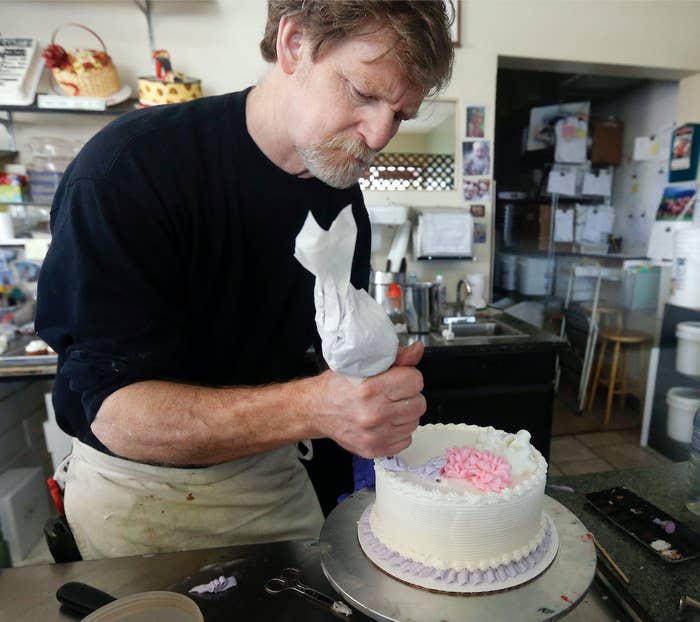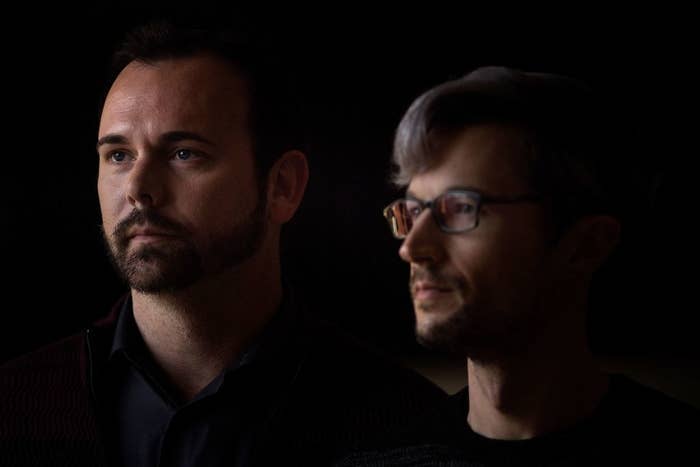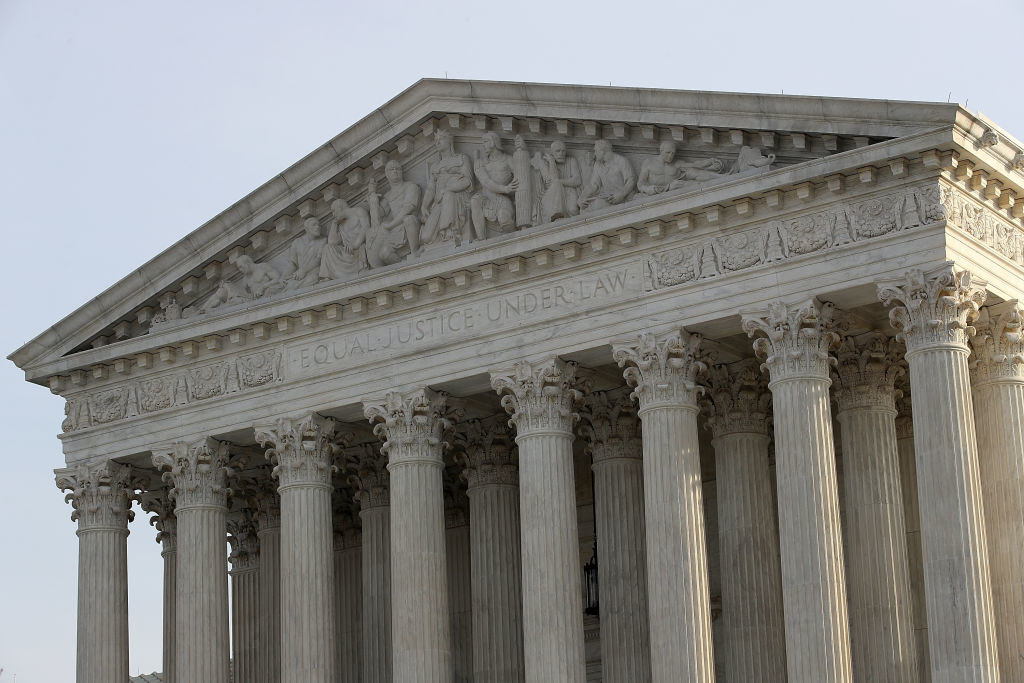
The Supreme Court will hear oral arguments on Tuesday in the polarizing case of a Colorado baker who refused to sell a wedding cake to a gay couple. The Trump administration will even be weighing in to support the Christian baker, saying he had a First Amendment right to turn away the couple.
The dispute has generated stacks of debate among the public — including some arguments that stray from the legal underpinnings of the case. One reader of the Denver Post asked if people would feel differently if the baker “refused to make a swastika shaped cake for a pair of neo-Nazis.” People may feel very differently about a swastika cake, but that's not the case — and it’s not the exact question for the Supreme Court.
Here's what you need to know about the legal dispute: what it is, and what it isn't.
Why this case is a big deal.
This is the highest-profile case over gay rights to reach the Supreme Court since the justices legalized same-sex marriage nationwide in 2015. It's seen as a test of whether, despite that marriage ruling, businesses open to the public can refuse to sell wedding-related products to same-sex couples.
It also could have implications for civil rights more broadly, depending how the court rules. While the facts of the case are about a cake, in an overarching sense, it explores whether business owners have a constitutional right to sidestep nondiscrimination laws aimed at protecting groups of people if the business owners believe adhering to the laws would trample their moral beliefs.

How we got here.
In 2012, Charlie Craig and David Mullins attempted to order a wedding cake from Masterpiece Cakeshop in Lakewood, Colorado. But in a 30-second interaction, without any discussion about the cake's possible design, owner Jack Phillips declined, saying it would violate his religious beliefs.
It’s legal to turn gay couples away from businesses in much of the country — but 21 states ban discrimination in places of public accommodation on the basis of sexual orientation, including in Colorado. (There are no federal LGBT public accommodation protections.) The Colorado Civil Rights Commission found Phillips ran afoul of that state’s law, and a state appeals court agreed. The US Supreme Court is now hearing an appeal.
What the case isn't about.
This lawsuit is not about whether business owners can ever turn away customers — sometimes they can, and both sides agree on this point. Nor is this strictly about religion.
Some folks, however, upon hearing about this case, argue businesses deserve the right to refuse service to anyone they choose. Otherwise, they say, black bakers and gay bakers would have to make swastika cakes and such. To understand why businesses in the US cannot refuse service to anyone, for any reason, we must look backward. Responding to a history of slavery, segregation, and prejudice, the civil rights movement pressed courts and lawmakers to prohibit certain types of discrimination. Most notably, the Civil Rights Act of 1964 bans discrimination in public accommodations based on certain characteristics — including race and religion. So if a restaurant will sell a product to one type of person (like a sandwich to a white man), it must sell that same product to another customer from the protected class (like a sandwich to a black man).
The application of this law is not all-encompassing, though. A business can turn away people, legally, for lots of reasons — like someone who's legitimately drunk and belligerent. Restaurants can turn away Christians and black people for being drunk and belligerent. But they can't turn those customers away because they're Christian or black.
Further, if a business doesn't make swastika cakes for anyone, then it doesn’t have to make swastika cakes for Nazis. The same is true for wedding cakes. The Supreme Court also ruled an expressive event (a conservative St. Patrick's Day parade) can shut out messages they disagree with (an LGBT group). This, in turn, likely means an LGBT pride parade doesn't need to let a white power float join the festivities.
This is all to say, there are limits to nondiscrimination rules — and the baker case is in a middle ground.
The legal argument is also not solely about a religion. Federal courts shot down such a claim in the 1960s when the owner of Piggie Park Enterprises claimed he could refuse entry to a black woman because "his religious beliefs compel him to oppose any integration of the races whatever." That argument lost in federal district court, and the US Supreme Court insisted the restaurant pay the plaintiffs’ attorney fees.

What this case is about.
Phillips's lawyers at the Alliance Defending Freedom contend that custom cakes are forms of creative expression, and thus, they’re a type of constitutionally protected speech and religious exercise. Just as the First Amendment allows Phillips to speak freely and practice his faith, they say, it also protects him from being forced to create a "message" that's tantamount to "participating" in the wedding.
In a brief to the Supreme Court, his lawyers write the “confluence of free-exercise [of religion] and free-speech rights forms a strong hybrid-rights claim.” If the court fails to rule for Phillips, they argue, LGBT nondiscrimination laws will coerce people into violating their conscience by condoning behavior they find immoral.
The Justice Department, which is also arguing in favor of Phillips on Tuesday, likewise argues that “forcing Phillips to create expression for and participate in a ceremony that violates his sincerely held religious beliefs invades his First Amendment rights.”
Phillips says he did not turn the couple away because they were gay — but because he didn't want to create a message.
But this is a distinction without a difference, according to lawyers for the couple at the American Civil Liberties Union.
For all practical purposes, the only people who have same-sex weddings are gay, lesbian, or bisexual people. Refusing service for those weddings — while serving straight weddings — is inherently related to the characteristics of the customers, the lawyers say. As such, they conclude, it’s discrimination on the basis of sexual orientation.
The couple's lawyers are concerned a ruling for the baker could threaten civil rights protections more broadly, creating a loophole for business owners — and service providers who say their work is creative — to claim a First Amendment right to ignore civil rights laws for mixed-race couples, religious minorities, and others.
The Colorado Civil Rights Commission, which is party to the case, adds that Colorado’s civil rights law serves a legitimate state interest by banning the “pervasive” problem of anti-gay discrimination. Further, the law concerns “commercial conduct, not protected expression,” the commission’s brief states, arguing there is no constitutional right at issue.
But allowing expressive businesses to opt out would create a slippery slope, the state continues. “For example, a family portrait studio could enforce a ‘No Mexicans’ policy,” the brief argues. “A banquet hall could refuse to host events for Jewish people. A hair salon could turn away a lesbian woman who wants a new hairstyle because she will be attending a special event.”

